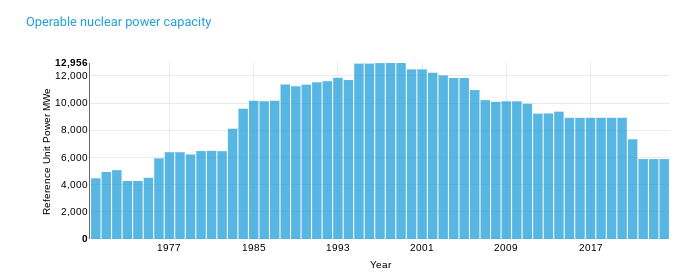France and major Asian markets are set to drive nuclear power to an all-time high in the next three years according to an international energy research group.
An International Energy Agency (IEA) report, released today, outlines that power from nuclear plants is expected to rise by about three per cent both this year and next to 2,915TWh, overtaking the previous peak of 2,809TWh in 2021, and by a further 1.5 per cent in 2026, the IEA said.
China is leading the world in terms of global nuclear capacity additions, the report says, with 26 GW currently under construction as it eyes the target of a completed fleet generating 70GW by 2025.
Combined, China and Russia also provide 70 per cent of the technology used for developing nuclear power.
Nuclear output from France and Japan is expected to climb as several reactors that have been offline for maintenance switch back on and new reactor projects begin commercial operations in many markets, including in India, Korea and Europe.
“The power sector currently produces more CO2 emissions than any other in the world economy, so it’s encouraging that the rapid growth of renewables and a steady expansion of nuclear power are together on course to match all the increase in global electricity demand over the next three years,” said IEA executive director Fatih Birol.
“This is largely thanks to the huge momentum behind renewables, with ever cheaper solar leading the way, and support from the important comeback of nuclear power, whose generation is set to reach a historic high by 2025. While more progress is needed, and fast, these are very promising trends.”
The news comes fresh off the back of November’s COP28 summit in Dubai, where more than 20 countries vowed to triple nuclear global capacity by 2050.
The report made no mention of the UK’s role in expanding global nuclear capacity, however, which is coming off the back of a 40-year low as four out of five plants are set to come offline by 2030 and delays on major reactor projects like Sizewell C and Hinkley Point C.
Tom Greatrex, chief executive of the Nuclear Industry Association, said of the report: “The science is clear, we need a significant ramp up in firm, clean power to meet energy security and decarbonisation targets, which currently, only nuclear provides.
“The challenge is how we can build enough capacity at pace and at scale to meet future demand, and the only way to do that is to build fleets of stations like the French, Japanese and Koreans have done. We need to start building large and small reactors and keep building, that’s the way to do it.”

The report also finds that the increase in electricity generation from renewables and nuclear appears to be pushing the power sector’s emissions into structural decline.
Global emissions from electricity generation are expected to decrease by 2.4 per cent in 2024, followed by smaller declines in 2025 and 2026.